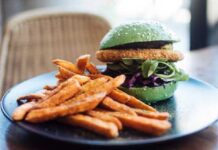
Mangosteen is a small, round fruit so revered in its native Southeast Asia that it’s called the “Queen of Fruits.” The fruit and bark of this tropical plant have been used for centuries to treat wounds, infections, menstrual disorders, and skin infections — and to boost immunity.
While there isn’t enough research that supports the multitude of health claims, this fruit is known to be rich in compounds that provide health-promoting properties.
Health Benefits of Mangosteen
Not related to the common mango, mangosteen is a distinctive and pleasant-tasting fruit with a hard, purple exterior and a white, segmented flesh. This fruit is also rich in phytochemicals, which are plant chemicals that help promote health and reduce disease risk.
The main phytochemicals found in mangosteen are xanthones, a group of compounds that have antioxidant and anti-inflammatory properties, according to a 2017 study published in the journal Food and Chemical Toxicology. These substances may also counter cancer, infection, and a variety of other health problems.
However, the majority of research on mangosteen has been done in a laboratory, studying the effects of high concentrations of mangosteen or xanthones on rodents or human cells in order to understand their effects.
1. Anti-Cancer Properties
Recently, these phytochemicals have been the subject of considerable study. A 2011 study published in Current Molecular Medicine found that the xanthones in mangosteen may prevent the development of or reduce tumor size in a variety of cancer types.
However, mangosteen extracts or products with high concentrations of xanthones were used in these studies, not brewed mangosteen tea. In addition, mangosteen has the potential to interfere with cancer drugs, underscoring the need for quality, human research.
2. Anti-Microbial Properties
Extracts from xanthones, the most notable class of phytochemicals found in mangosteen, have been found to have antibacterial, antiviral, and antifungal properties.
For instance, in one 2019 study in PeerJ, topical application of mangosteen extract was found to inhibit certain strains of Staphylococcus bacteria. And 2008 study published in Complementary Therapies in Medicine found topical use was also found to improve dental health and reduce the risk of dental caries, or cavities, and counter gum disease.
These benefits are linked to both antibacterial and anti-inflammatory effects. Laboratory research has demonstrated that mangosteen extracts inhibit the dengue virus and malaria. Again, extracts and mangosteen peel were used in this research, not home-brewed tea.
3. Other Benefits
Components of the mangosteen plant have also been linked to benefits that may improve blood sugars and aid in weight loss. This fruit’s high antioxidant content and anti-inflammatory potential hold promise it can help protect the body from damage.
For instance, a 2018 study on rodents from the International Journal on Molecular Sciences showed that mangosteen compounds counter liver damage from acetaminophen, the ingredient in Tylenol. And a 2017 study also from the International Journal on Molecular Sciences found mangosteen extracts can protect hairless mice from sun damage.
Additional research suggests the properties of mangosteen may help with nerve damage, bowel disease, and high blood pressure. However, the effect of mangosteen tea, or any mangosteen products on human subjects, still needs to be clarified.
But What About Mangosteen Tea?
While a 2015 human study from the journal Food Science and Nutrition showed that mangosteen juice improved markers of antioxidant and anti-inflammatory action in the blood, it’s not clear if mangosteen tea has the same effect.
But mangosteen is a nutritious fruit that can be consumed whole or made into tea. To make mangosteen tea, cut up and steep the rind in boiling water, and then cool down enough to safely drink. Alternatively, you can add mangosteen tea leaves to hot water.
The fruit can also be made into jam or used in desserts. You might find fresh mangosteen at Asian or other specialty food markets, but in the U.S., it’s more common to find dried mangosteen rind, mangosteen tea leaves, or canned or frozen mangosteen fruit.
Warnings and Precautions
Mangosteen fruit and tea are generally considered safe to consume without side effects. However, there isn’t enough human research to clarify health effects or benefits, including any risks of large doses or supplements. In addition, mangosteen has the potential to interact with certain medicines, although it’s not clear if the amounts in tea will have any effect.
If you’re under a doctor’s care for any medical condition, or if you take any prescription medications, talk to your doctor about risks and benefits if you plan to use mangosteen supplements or consume large amounts of this product.
References and Resources:
- Current Molecular Medicine: Xanthones from Mangosteen Extracts as Natural Chemopreventive Agents — Potential Anticancer Drugs
- Complementary Therapies in Medicine: Topical Application of Garcinia Mangostana L. Pericarp Gel as an Adjunct to Periodontal Treatment
- Food and Chemical Toxicology: Medicinal Properties of Mangosteen (Garcinia mangostana): A Comprehensive Update
- PeerJ: Recent Updates on Metabolite Composition and Medicinal Benefits of Mangosteen Plant
- Food Science and Nutrition: Daily Consumption of a Mangosteen-Based Drink Improves in Vivo Antioxidant and Anti-Inflammatory Biomarkers in Healthy Adults: A Randomized, Double-Blind, Placebo-Controlled Clinical Trial
- International Journal of Molecular Sciences: Dietary α-Mangostin Provides Protective Effects against Acetaminophen-Induced Hepatotoxicity in Mice via Akt/mTOR-Mediated Inhibition of Autophagy and Apoptosis
- International Journal of Molecular Medicine: Protective Effects of Compounds From Garcinia Mangostana L. (Mangosteen) Against UVB Damage in HaCaT Cells and Hairless Mice
- Memorial Sloan Kettering Cancer Center: Mangosteen
Important Notice: This article was originally published at www.livestrong.com by Joanne Marie where all credits are due. Medically Reviewed by Kay Peck, RD, MPH.
Disclaimer
The watching, interacting, and participation of any kind with anything on this page does not constitute or initiate a doctor-patient relationship with Dr. Farrah®. None of the statements here have been evaluated by the Food and Drug Administration (FDA). The products of Dr. Farrah® are not intended to diagnose, treat, cure, or prevent any disease. The information being provided should only be considered for education and entertainment purposes only. If you feel that anything you see or hear may be of value to you on this page or on any other medium of any kind associated with, showing, or quoting anything relating to Dr. Farrah® in any way at any time, you are encouraged to and agree to consult with a licensed healthcare professional in your area to discuss it. If you feel that you’re having a healthcare emergency, seek medical attention immediately. The views expressed here are simply either the views and opinions of Dr. Farrah® or others appearing and are protected under the first amendment.
Dr. Farrah® is a highly experienced Licensed Medical Doctor certified in evidence-based clinical nutrition, not some enthusiast, formulator, or medium promoting the wild and unrestrained use of nutrition products for health issues without clinical experience and scientific evidence of therapeutic benefit. Dr. Farrah® has personally and keenly studied everything she recommends, and more importantly, she’s closely observed the reactions and results in a clinical setting countless times over the course of her career involving the treatment of over 150,000 patients.
Dr. Farrah® promotes evidence-based natural approaches to health, which means integrating her individual scientific and clinical expertise with the best available external clinical evidence from systematic research. By individual clinical expertise, I refer to the proficiency and judgment that individual clinicians acquire through clinical experience and clinical practice.
Dr. Farrah® does not make any representation or warranties with respect to the accuracy, applicability, fitness, or completeness of any multimedia content provided. Dr. Farrah® does not warrant the performance, effectiveness, or applicability of any sites listed, linked, or referenced to, in, or by any multimedia content.
To be clear, the multimedia content is not intended to be a substitute for professional medical advice, diagnosis, or treatment. Always seek the advice of your physician or other qualified health providers with any questions you may have regarding a medical condition. Never disregard professional medical advice or delay in seeking it because of something you have read or seen in any website, video, image, or media of any kind. Dr. Farrah® hereby disclaims any and all liability to any party for any direct, indirect, implied, punitive, special, incidental, or other consequential damages arising directly or indirectly from any use of the content, which is provided as is, and without warranties.








